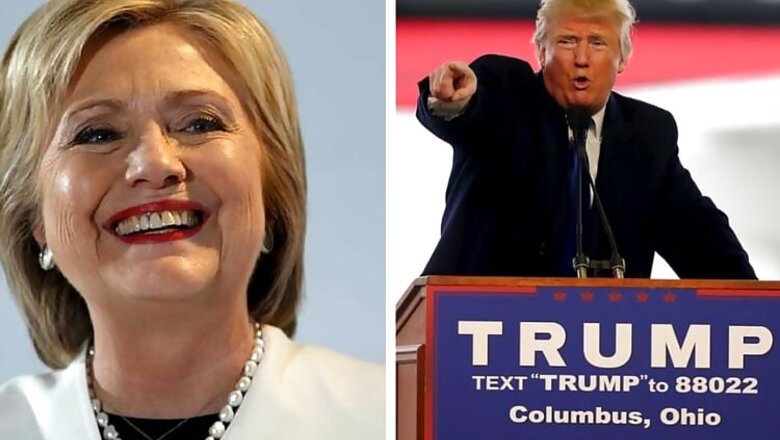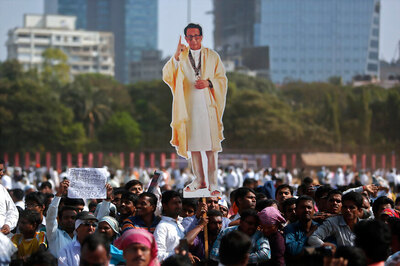
views
Washington: Republican Donald Trump and Democrat Hillary Clinton moved closer to winning their parties' nominations with a series of victories in the Super Tuesday elections, the biggest day of the primary campaign.
Clinton and Trump each won at least six of 11 state races as they looked to distance themselves from party rivals and move closer to a November presidential election showdown.
Ted Cruz, a firebrand conservative senator, won his home state of Texas and Oklahoma as he sought to emerge as Trump's main rival. Clinton's only opponent, Bernie Sanders, also won Oklahoma, as well as his home state of Vermont.
Cruz desperately needed the win in Texas in order to stay in the race, and was likely to keep campaigning as the only Republican who has been able to defeat Trump in any primary contest. He also won the leadoff Iowa caucuses.
For Marco Rubio, who is also seeking to emerge as the main alternative to Trump, the night was turning into a disappointment. While a flood of Republican officeholders have rallied around him in recent days, his first state victory remained elusive as results rolled in. His long-shot hopes now rest with his home state, Florida, which votes on March 15, but polls show him trailing Trump there.
Trump won in Virginia, Arkansas, Alabama, Massachusetts, Tennessee and Georgia on Super Tuesday.
Clinton, the former secretary of state and senator, won in Texas, Arkansas, Alabama, Tennessee, Georgia and Virginia. The wins reflected her strength in the South, where black voters are an important part of the Democratic base and overwhelmingly support her.
Voting was still ongoing in other contests or the races were too close to call.
Trump, the brash billionaire and reality TV star, has stunned the Republican political establishment by winning three of the first four contests, seizing on the anxieties of voters angry at Washington and worried about terrorism, immigration and an uncertain economy. Using simple terms, and often coarse language, he has soared to the top of polls with his pledge to "make America great again."
Republican officials, fearing a Trump sweep, have been lashing out at his temperament and command of the issues in the hours before voting began.
"You've got a con man and a bully who is moving forward with great speed to grab the party's mantle to be its standard bearer," Norm Coleman, a former senator who backs Marco Rubio, said in an interview with The Associated Press. "That's almost incomprehensible."
Clinton, once seen as the all-but-inevitable Democratic nominee, has contended with an unexpectedly strong challenge from Sanders, a senator and self-described democratic socialist. But Clinton, like Trump, had also won three of the first four races, including a landslide victory in South Carolina on Saturday.
Candidates are trying to win delegates who will vote for them at the parties' conventions in July. For Republicans, 595 delegates were at stake, nearly half of the 1,237 needed for the nomination. Democrats were allocating 865 delegates, more than one-third of the 2,383 needed to become the nominee.
Clinton is now assured of winning at least 334 delegates Tuesday and Sanders 145. Including superdelegates - party leaders who get to vote for candidates at the convention - Clinton now has at least 882 delegates. Sanders has at least 232.
Trump has won at least 139 of the delegates at stake on Super Tuesday, while Cruz has won at least 52 and Rubio 25. Overall, Trump leads with 221 delegates. Cruz has 69, Rubio has 41, Ohio Gov. John Kasich has 19 and retired neurosurgeon Ben Carson has seven.
Both Cruz and Rubio have launched furious verbal attacks on Trump in recent days, but some in the party establishment fear the anti-Trump campaign has come too late.
Republicans spent months largely letting Trump go unchallenged, wrongly assuming that his populist appeal with voters would fizzle. Instead, he's appeared to only grow stronger, winning states and drawing support for some of his most controversial proposals.
In six of the states voting Tuesday, large majorities of Republican voters said they supported a proposal to temporarily ban all non-citizen Muslims from entering the United States, an idea championed by Trump. The exit polls were conducted by Edison Research for The Associated Press and television networks.
Republicans fear Trump will damage their prospects of recapturing the White House after Barack Obama's two terms. The worries appeared to grow after Trump briefly refused to disavow the apparent support of a former Ku Klux Klan leader, David Duke, during a television interview. Trump later said he had not understood the TV interviewer and he did repudiate Duke.
The disarray among Republicans comes as Clinton, seeking to become America's first female president, has tightened her grip on the Democratic race. She has increasingly turned her attention away from Sanders and on to Trump, casting herself as a civil alternative to the insults and bullying that have consumed the Republican race.
In addition to her state victories, Clinton won in American Samoa, picking up four of six delegates in the South Pacific island chain.




















Comments
0 comment